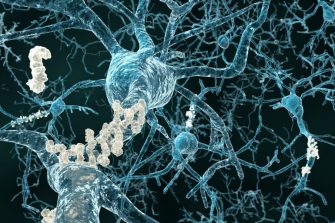Link between chronic stress and comfort eating: mouse study
2023-06-09T10:49:00+10:00

A new study in mice shows that stress can override natural satiety cues and drive cravings for sweet foods.
When you’re stressed, a high-calorie snack may seem like a comforting go-to. But this combination has an unhealthy downside. According to new research from the Garvan Institute of Medical Research and UNSW Sydney done in mice, stress combined with calorie-dense ‘comfort’ food creates changes in the brain. These changes can drive more eating, boost cravings for sweet, highly palatable food, and lead to excess weight gain.
The research study, published today in Neuron, found that stress overrode the mouse brain’s natural response to satiety, leading to non-stop reward signals that promote eating more highly palatable food. This occurred in a part of the brain called the lateral habenula, which when activated usually dampens these reward signals.
“Our findings reveal stress can override a natural brain response that diminishes the pleasure gained from eating – meaning the brain is continuously rewarded to eat,” says senior author Professor Herbert Herzog, Conjoint Professor at UNSW Medicine & Health and Visiting Scientist at the Garvan Institute.
“We showed that chronic stress, combined with a high-calorie diet, can drive more and more food intake as well as a preference for sweet, highly palatable food, thereby promoting weight gain and obesity. This research highlights how crucial a healthy diet is during times of stress.”
Media enquiries
For enquiries about this story and interview requests, please contact Dr Vivian Richter.
Tel: + 61 2 9295 8128 | + 61 404 999 682
Email: v.richter@garvan.org.au
Driving comfort eating
The researchers next performed a ‘sucralose preference test’ – allowing mice to choose to drink either water or water that had been artificially sweetened.
“Stressed mice on a high-fat diet consumed three times more sucralose than mice that were on a high-fat diet alone, suggesting that stress not only activates more reward when eating but specifically drives a craving for sweet, palatable food,” Prof. Herzog says.
“Crucially, we did not see this preference for sweetened water in stressed mice that were on a regular diet.”
Stress overrides healthy energy balance
“In stressful situations it’s easy to use a lot of energy and the feeling of reward can calm you down – this is when a boost of energy through food is useful. But when experienced over long periods of time, stress appears to change the equation, driving eating that is bad for the body long term,” Prof. Herzog says.
The researchers say their findings point to stress as a regulator of eating habits that can override the brain’s natural ability to balance energy needs. The NPY system is highly conserved in evolution and mouse and human NPY are identical. However, further research will be needed to understand how the findings in mice will apply to humans.
“This research emphasises just how much stress can compromise a healthy energy metabolism,” says Professor Herzog. “It’s a reminder to avoid a stressful lifestyle, and crucially – if you are dealing with long-term stress – try to eat a healthy diet and lock away the junk food.”





